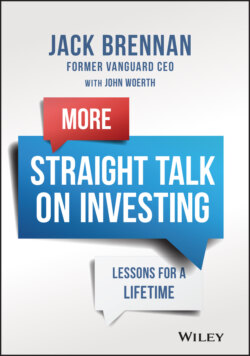Читать книгу More Straight Talk on Investing - John J. Brennan - Страница 14
A Great Time to Be an Investor
ОглавлениеThis is a great time to be an investor. You have a wide variety of investment vehicles, including thousands of mutual funds and exchange-traded funds (ETFs), from which to assemble an investment program. Educational material has never been more accessible, which means you'll have no trouble finding resources to help become more knowledgeable about the subject. The internet makes it easy to monitor and manage your investments at any time of day, no matter where you are. And thanks to Individual Retirement Accounts (IRAs), 401(k) plans, and other tax-advantaged vehicles, you can secure attractive tax benefits when you put away money for your future. Generally speaking, the financial markets of today work effectively and efficiently. And, very importantly, the costs to invest have never been lower.
Today, millions of people are investing. For instance, 46% of American households own mutual funds and 63% invest via a tax-advantaged savings plan, according to the Investment Company Institute. Still, many segments of our country are not investing. Data from the Center for Household Financial Stability reveals that three in five millennials have no exposure to the stock market. And for those in this generation who invest in stocks, their holdings are low. Meanwhile, Black and Hispanic households are also more likely to lack investment accounts relative to other races. We will never be the country of equal opportunity that we must be if this holds true in the future.
Today's era offers great advantages, but they are only advantages if you participate. You must also steel yourself for two challenges. The first challenge comes from the traditional and social media, as well as those who make a living or a hobby of sharing their “wisdom.” Most pay far too much attention to short-term events in the financial markets. In fact, news stories about the markets and investing read like the articles in the sports pages. Who won today? Who are the hot players? Who's going to have the best season? Who's first in the standings? With so much excited and inescapable commentary about every market move, it's no wonder that ordinary people sometimes feel intimidated or overwhelmed.
This is not to say that there is not thoughtful coverage of investing matters. In investing, less is often more in terms of news flow. Without being too nostalgic, my favorite example of that view is a TV show that ran from the early 1970s to the early 2000s. Wall $treet Week with Louis Rukeyser offered sensible and studied observations of the financial markets. One key attribute was that it aired only once per week, which enabled the host and guests to move away from the minute-to-minute commentary that's now all too frequent. (The program continues today on Bloomberg TV.) Today, of course, there are plenty of reputable websites, radio programs, and podcasts accessible to you that can help you take charge of your financial life and become a better investor. I merely encourage you to be a discriminating consumer of financial media. And don't let it become a competitor of your favorite steaming series, radio program, or podcast for your time.
The second challenge comes from the financial services industry itself. To be clear, it's in the interest of many companies to make you think that investing is difficult and complex. They make money by selling investment products and advice. As you've no doubt noticed, there's no shortage of brokers, investment advisors, and financial planners eager to sign you on as a client and charge you for their services. Recognize that there are some financial professionals who want to make you think you can't make your own investment decisions. Don't believe them.
Your task is to separate the proverbial “wheat from the chaff” (i.e., the useful and actionable information from the noise). The reality is that you can succeed at accumulating wealth without spending time trying to keep up with daily events, incessantly listening to talking heads on TV, or paying someone else hefty sums to invest on your behalf. When you feel intimidated by the so-called experts, remember that they don't necessarily know more than you do. Indeed, every few years, we see headlines about financial hotshots who have lost millions and even billions of dollars through complicated trading schemes or big bets that went awry. What you don't see frequently in the news are the countless stories of individual investors who are quietly and prudently amassing wealth through sensible and disciplined investment programs. These individuals follow the four priorities of confident investing:
1 Be knowledgeable: Do your homework.
2 Be disciplined: Develop good habits.
3 Be skeptical: Avoid fads.
4 Be observant: Keep learning about investing.
The following section covers each priority in greater detail.
